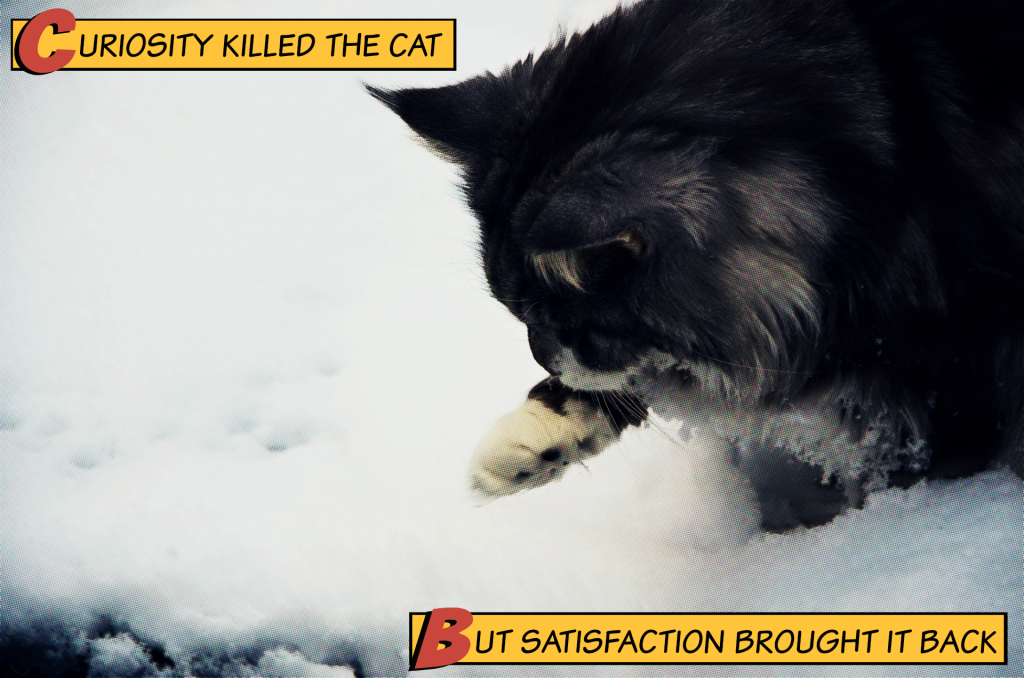Curiosity Killed The Cat — There is More to Proverbs Than You Think!
Proverbs are often and excessively used to express yourself. You can find them in newspapers, online articles, books, magazines, tweets… everywhere!
But there is more to the proverbs we know! For some, the meaning changed over time, almost changing completely. Others have rejoinders (or replies) that change the meaning or even invert it.
Thus, if you plan on using a proverb in your writing, or are just looking for a witty response to someone who likes throwing them around, check out these 5 proverbs that are not like you may know them.
These Proverbs Are Not Like You Know Them!
Curiosity killed the cat
The saying of “curiosity killed the cat” originated in 1598 in a play that was written by Ben Johnson and adapted to by William Shakespeare. The original wording was: “Care killed the cat”.
The first reference of the modern usage with “curiosity” dates back to 1873. It was incorporated in A handbook of proverbs: English, Scottish, Irish, American, Shakespearean, and scriptural; and family mottoes by James Allan Mair.
The meaning we know: Don't be too curious and do not put your nose into everything if you don't want to get hurt!
Curiosity killed the cat, but satisfaction brought it back
The version with the rejoinder “but satisfaction brought it back” is, sometimes, falsely assumed to be the original version. It’s first mention, however, does not date back as far as the aforementioned proverb. It was first recorded in 1905 and worded as “Curiosity killed a cat; but it came back”.
The first mention including “satisfaction” dates back to 1912.
The altered meaning: While curiosity may harm you, the satisfaction of finding knowledge/the truth is worth it. So be curious, strive to find the truth and gain knowledge!
Blood is thicker than water
“Blood is thicker than water” made it’s first appearance in a beat epic from Germany, namely in the fable Reinhart Fuchs.
In 1670, the proverb was mentioned in it’s more modern form in John Ray’s Proverbs.
The meaning we know: Family comes first! A member of your family is always more important than any outside bonds!
The blood of the covenant is thicker than the water of the womb
This is an actually quite popular interpretation of the aforementioned proverb by Albert Jack and R. Richard Pustelniak.
The altered meaning: A bond sealed by blood between comrades, and thereby by choice, is stronger than one formed by birth!
Jack of all trades
Known as “Johannes factotum” or “Johnny do-it-all”, this proverb originated from Elizabethan English. It was, however, used in a more benevolent way than today.
The original meaning: An expert in his/her field.
Jack of all trades, master of none
One of the earliest, negative and most famous mentions of this proverb is by Robert Greene in 1592 who referred to William Shakespeare as a Jack of all trades.
The meaning we know: Someone who has superficial knowledge about many things but can do none of them in a correct/proper way.
Jack of all trades, master of none, though oftentimes better than master of one
However, did you know that there is an extended version of this proverb. The one above is said to be the full text.
The altered meaning: It's better to have superficial knowledge of many things than just being an expert of one single thing and having no idea about anything else at all.
Great minds think alike
There is no definite first mention of the saying “great minds think alike”, but it is said to originate in the early 17th century. One of the earliest notions of the current phrase was found in a writing from 1816 by Theodor von Ulanski.
The meaning we know: Used when two (or more) people come to the same conclusion.
Great minds think alike, but fools seldom differ
Adding this rejoinder that is almost exclusively found in British English, immediately takes the nice ring this proverb had, right?
The altered meaning: People that have a narrow horizon or limited intelligence also reach the same conclusions. Thus, an idea that many people had doesn't necessarily have to be a good idea.
Carpe Diem
“Carpe diem” dates back as far as 23 BC. It’s a Latin aphorism found in Horace’s “Odes”. Translated, it means “seize the day”.
You have surely heard of an acronym that had come up not too long ago that represents almost the same meaning: YOLO.
The meaning we know: Enjoy the pleasures of today and do not worry about tomorrow!
Carpe Diem, Quam Minimum Credula Postero
The original meaning, however, differs a lot from the carefree, modern take. The full sentence can roughly be translated as “seize the day, put very little trust in tomorrow”.
The altered meaning: Do everything you can today to make the future better. Study and prepare, do not let laziness stop you from having a brighter tomorrow.
Surprised?
Now, you will surely be able to use your proverbs more wisely in your writing and everyday speech. Which one of these surprised you the most? Are there other proverbs with different meanings in the past and today?
Let us know!



